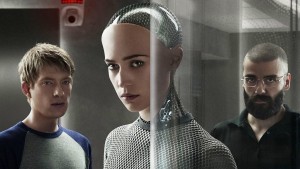Alex Garland’s Ex Machina is one of those movies that’s very hard to review without spoilers. It’s got a conclusion I kind of didn’t see coming, though I did guess some of the twists and turns before the end.
I can tell you that 1) yes it’s entertaining, and 2) yes it’s thought-provoking, if you have steeped yourself in the literature of the Singularity and the possibility of what we call “strong AI.” That is to say artificial intelligence that can pass the Turing Test.
The Turing Test was proposed by mathematician and cybernetics pioneer Alan Turing, who is currently the subject of the movie “The Imitation Game.”
Turing suggested we’d know we’d created an intelligent being when a human could sit in a room with a teletype (this was a while ago) and exchange messages with a correspondent he couldn’t see. If at the end of a lengthy conversation he couldn’t tell if it was a human or a machine at the other end, we’d know.
At some indeterminate time in the near future Caleb (Domhnall Gleeson) is brought to the Alaskan hideaway of multi-billionaire genius Nathan (Oscar Isaac), who coded the world’s largest search engine when he was 13. It must have blown Google out of the water by then.
Nathan is experimenting with strong AI in the form of robots. Specifically one robot Ava (Alicia Vikander) who appears to be partly an attractive woman with body parts made of transparent plastic that reveal the inner machine.
These are only speaking parts in the movie. The only other character that interacts with the trio is Nathan’s beautiful mute servant/lover Kyoko (Sonoya Mizuno).
Caleb has ostensibly been brought to conduct a Turing Test on Ava. In a series of seven sessions he simply has to engage in dialog with Ava and at the end give an opinion as to whether she passes.
Of course there’s more to it than that. All the characters are engaged in various kinds of manipulation – and that’s part of the test too.
Nathan is a seriously unlikable character, and he’s also consciously aware that he may be creating humanity’s replacement. Does that make him a god of sorts – or just yesterday’s news in an unimaginable future?
How will the AIs of the future feel about us, and how much does that depend on how we treat them? (Hint: reread Frankenstein, the original by Mary Shelley not the Hammer films.)
Would an intelligent entity without glands and hormones have any kind of motivations we’d understand at all? Would the concept of gender mean anything to them? How about self-preservation?
Sam Goldwyn famously said, “If you want to send a message, use Western Union,” meaning message flicks are all too prone to become didactic, heavy-handed and boring.
Ex Machina does a pretty good job of letting the questions suggest themselves – if you’re the kind of person who thinks about that sort of thing. If not, the plot comlications might still entertain.

